Terry Shames's Blog: 7 Criminal Minds, page 228
March 30, 2016
Careening Toward The End
Within a day or two, I’ll be writing The End. Of course as any writer knows, that really means The Beginning. Yes, I’ve got 75,000 plus or minus words on paper, but do I have a book? I know I have a book-like product, but it’s a long way from finished.
I’m actually surprised to be this far along. I had only a few pages written when I started working in earnest in February. My goal was to pound out 60,00 words before a two-week vacation mid-to-late March. Happily, I met the goal, but to my surprise I kept finding ways to sneak more words onto the page while I was gone. I know there are people for whom a vacation is a glorious opportunity not to think about “work” at all. And that’s where the difference lies. Writing is work, but it’s also a passion.

Here’s what passion means: I was on a tour of Baja (see above photo of the strange boojum tree), that included two up-close-and-personal whale-watching events. Gray whales in the bay where we were located eagerly approach boats to be touched. The first day we went out, the waves were rough and although the whales tried to get close, they hung back because the boats were bashing around so much. Two days later we had another opportunity to go out. I decided to stay behind and work. Yep, forgoing a chance to touch a whale so that I could satisfy my yearning to go forward on my book. Partly, I needed some alone time because as much as I enjoyed the company of the small tour group, I’m used to time alone.
The result of the day was that most everyone got to “pat” the whales. I missed it. But in fact, I was deeply satisfied in my own way. I wrote and wrote, and felt really good about it. If I had it to do over, I would make the same choice. I understand that for some on the trip, they were passionate about a special encounter with another species. I had my own passion to satisfy.
I didn’t have to make so stark a choice on other days, but I slipped off to write 500 words here, 1,000 words there, and came home with a 71,000-word manuscript. So now I’m almost done, and the real work begins—shaping that big stew of words into the book I envision. More next week on the editing process. But as soon as I write The End, I’ll let it steep for a few days.
Book Recommendation: Yes, I know I’ve raved about Adrian McKinty before, but here I go again. He writes about Belfast during “the troubles” in the early 1980s. His protagonist, Sean Duffy, is a Catholic cop in a Protestant world. He’s as real a protagonist as I’ve ever read. The series was to be a trilogy, but he extended it, so I’m reading that strange duck, the fourth in a trilogy. This one is called Gun Street Girl. I don’t just recommend it; I insist you read the whole series.
Sunset on our last day sailing:

Published on March 30, 2016 07:41
March 9, 2016
My Odd Relationship with Vacations
Friday I’m leaving for Baja California for two weeks. The first week is an educational trip along the west coast; the second will be on our boat along the tip of Baja near La Paz. I love the desert and I’m sure it will be a wonderful trip.

I always say I’m excited about traveling, but part of me usually dreads it. It isn’t the packing and the wearisome job of making all the connections, or the fear that I’ll find I’ve forgotten something essential—passport? toothbrush? medicines? No, it’s the actual going away from home that I mind. Partly I mind the guilt I feel about leaving my two terriers, who seem traumatized if I go the grocery store. But that’s only a small part of the dread. What I really dread is missing the everyday wonders of my surroundings. I’ll miss the height of the wisteria bloom season or the short burst of tulips. I won’t be there for a particular weekend festival I like, or for someone’s wedding. I’ll miss my daily routines. Especially writing. Yes, I know I should be glad for a break. But…
In the first couple of days of a vacation I think to myself, “Okay, you only have twelve days to go. Only eleven more days. Only ten days.” But then at some point I begin to feel enchanted with my new “home.” I settle in to hearing a language that I don’t understand, start to feel an affinity with the landscape, start to adopt new rhythms. And by the time I have to leave, I get dread again—this time gathering myself to go home.
Some people would say I have trouble with transitions. But that isn’t really the case. I’m adaptable. Actually the problem is that I fall in love with wherever I am. Some people say they could never live in a big city, or a small town, or the country, or the mountains, or the seaside. I know that I could live almost anywhere. Once we lived in Italy for 1 ½ years, and by the time we left it was like I was leaving a place I had lived all my life. Another time we stayed for a month on a particular island in the Bahamas. I still mourn losing my stroll to the local coffee shop where there was always a jigsaw puzzle being worked on and where I easily fell into the enjoyment of listening to the daily gossip.
I sometimes get interview questions that say, “If you could live anywhere, where would it be?” The answer is, “anywhere.” Give me a couple of days and I start putting down roots. So as much as I dread leaving Friday, I know that I’ll put down some fresh roots—even if it’s only for a week. And I won’t want to leave.
In the end, what vacation does is feed my imagination so that I go home to my writing refreshed. I have to remember that.
Published on March 09, 2016 07:10
March 2, 2016
Left Coast Crime
Left Coast Crime
As I wrote last week, Left Coast Crime is my favorite conference. I always love seeing writing buddies and having a chance to talk shop. Some people say they sneak off to their room to write during the conference, but I’m usually too keyed up to do that. It actually feels like a mini-vacation—at high speed.
This year some of the memorable moments were a bit of a surprise. I attended a panel of people who write ancient mysteries. The panelists were Priscilla Royal, Sharon Newman, Judith Starkson, and John Maddox Roberts, moderated by Susan McDuffie. It was so stimulating that at one point I got excited about writing something like that myself, until I thought, “What are you, nuts?” It has obvious that each of those writers had tken years to learn all they needed to write about these periods. What I took away is that no matter what you write, you have to ground your work in a strong sense of time and place and the characters that inhabit that time and place.
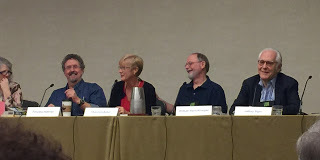
Another panel I liked was Writing Other Cultures, with Tim Hallinan, Jeffrey Stiger, Shannon Baker, and William Kent Krueger, moderated beautifully by Paty Jager. One of the most interesting moments was when Shannon admitted that she was sorry she had chosen to write about the Hopi, because they are such a closed tribe. Which illuminated what the others had to say about being steeped in cultures that were foreign to them but which they managed to immerse themselves in. In the end the takeaway was the same as the panel I mentioned earlier. It isn’t exactly “Write what you know,” It was more like “Know what you write.”
It isn’t just panels where you learn things, though. I had a wonderful conversation with Matt Coyle about writing. His work is very different from mine, but we both take our work seriously and found out we had something to offer each other. I also had a chance to talk with Barry Lancet and Tim Hallinan, learning about their processes and the things that stimulated their writing. Each of them has spent many years living in other countries and were still learning about their adopted cultures.
Another thing that you get at conferences is a chance to interact with fans. I never much thought about having “fans,” and still get a tremendous thrill when someone approaches me to tell me how much they enjoy my books. And I get to be a fan as well, mingling with writers I admire.
One last crazy moment occurred when I finally met Lou Berney. I took one look at him and realized that I had met him years ago—when he was my seminar leader at the Squaw Valley Writers Conference. I admired him then and had even more to admire now that I have read his wonderful book The Long and Faraway Gone. If you haven’t read it, do yourself a favor. It’s my book recommendation for the week.
Now I have to hunker down and start reading the books I brought home. After promising myself to resist, I felt like a thief sneaking in to buy “just one more book.”
As I wrote last week, Left Coast Crime is my favorite conference. I always love seeing writing buddies and having a chance to talk shop. Some people say they sneak off to their room to write during the conference, but I’m usually too keyed up to do that. It actually feels like a mini-vacation—at high speed.
This year some of the memorable moments were a bit of a surprise. I attended a panel of people who write ancient mysteries. The panelists were Priscilla Royal, Sharon Newman, Judith Starkson, and John Maddox Roberts, moderated by Susan McDuffie. It was so stimulating that at one point I got excited about writing something like that myself, until I thought, “What are you, nuts?” It has obvious that each of those writers had tken years to learn all they needed to write about these periods. What I took away is that no matter what you write, you have to ground your work in a strong sense of time and place and the characters that inhabit that time and place.

Another panel I liked was Writing Other Cultures, with Tim Hallinan, Jeffrey Stiger, Shannon Baker, and William Kent Krueger, moderated beautifully by Paty Jager. One of the most interesting moments was when Shannon admitted that she was sorry she had chosen to write about the Hopi, because they are such a closed tribe. Which illuminated what the others had to say about being steeped in cultures that were foreign to them but which they managed to immerse themselves in. In the end the takeaway was the same as the panel I mentioned earlier. It isn’t exactly “Write what you know,” It was more like “Know what you write.”
It isn’t just panels where you learn things, though. I had a wonderful conversation with Matt Coyle about writing. His work is very different from mine, but we both take our work seriously and found out we had something to offer each other. I also had a chance to talk with Barry Lancet and Tim Hallinan, learning about their processes and the things that stimulated their writing. Each of them has spent many years living in other countries and were still learning about their adopted cultures.
Another thing that you get at conferences is a chance to interact with fans. I never much thought about having “fans,” and still get a tremendous thrill when someone approaches me to tell me how much they enjoy my books. And I get to be a fan as well, mingling with writers I admire.
One last crazy moment occurred when I finally met Lou Berney. I took one look at him and realized that I had met him years ago—when he was my seminar leader at the Squaw Valley Writers Conference. I admired him then and had even more to admire now that I have read his wonderful book The Long and Faraway Gone. If you haven’t read it, do yourself a favor. It’s my book recommendation for the week.
Now I have to hunker down and start reading the books I brought home. After promising myself to resist, I felt like a thief sneaking in to buy “just one more book.”
Published on March 02, 2016 08:10
February 23, 2016
Left Coast Crime
Off to LCC
Left Coast Crime is my favorite conference. Sure I like Bouchercon. It’s the biggest and most exciting. Malice is elegant and friendly. Thrillerfest is …well, it’s New York. I hope to get to Killer Nashville one day. I hear that I will love it. And there are plenty of other small conferences that appeal in various ways.
So why is LCC my fave? First, it’s in my backyard. So to speak. That means it’s west of the Rockies—including Hawaii. The second is related to the first. Because it’s on the west coast, it includes a lot of people I know—not just Facebook friends, but face to face friends.
So tomorrow I’ll be on the plane to Phoenix and looking forward to seeing writing friends who are something like family—friends I may only see once a year, but who know what my daily world is like.
I also have a personal warm feeling about LCC because it sponsored the first award I was ever nominated for. The fact that my co-nominees were Sue Grafton, Tim Hallinan, Darryl James, and William Kent Krueger made it ultra-special. I’ll always have that memory. And it will always be associated with LCC.
Here are a few photos:
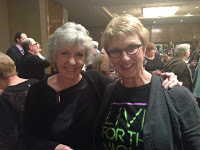
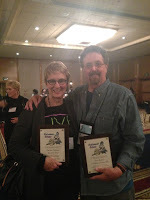
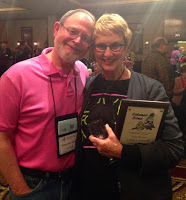

Tomorrow morning! I can hardly wait.
Left Coast Crime is my favorite conference. Sure I like Bouchercon. It’s the biggest and most exciting. Malice is elegant and friendly. Thrillerfest is …well, it’s New York. I hope to get to Killer Nashville one day. I hear that I will love it. And there are plenty of other small conferences that appeal in various ways.
So why is LCC my fave? First, it’s in my backyard. So to speak. That means it’s west of the Rockies—including Hawaii. The second is related to the first. Because it’s on the west coast, it includes a lot of people I know—not just Facebook friends, but face to face friends.
So tomorrow I’ll be on the plane to Phoenix and looking forward to seeing writing friends who are something like family—friends I may only see once a year, but who know what my daily world is like.
I also have a personal warm feeling about LCC because it sponsored the first award I was ever nominated for. The fact that my co-nominees were Sue Grafton, Tim Hallinan, Darryl James, and William Kent Krueger made it ultra-special. I’ll always have that memory. And it will always be associated with LCC.
Here are a few photos:




Tomorrow morning! I can hardly wait.
Published on February 23, 2016 22:26
February 17, 2016
Authenticity
I get lots of nice emails and social media shout-outs for my books, for which I am profoundly grateful. I also frequently find my books on “Best of (fill in the year)” posts. And I have been thrilled with good reviews and the occasional award nomination alongside some of my heroes. I cherish the photos I have with Tim Hallinan, Sue Grafton, William Kent Kruger, and a few other writers I admire. All these things astonish me, because I figured I would be satisfied with just being published and finding a few readers who liked my books.
Here's a photo with two fans who drove four hours to my reading in Austin:

No, this isn’t a bragfest, nor is it a plea for reassurance. It’s an honest attempt to examine the feeling I sometimes have that it’s all pure luck, and that the next book I write is going to unmask me as a fraud who just lucked into some good reviews and some good friends who were generous enough to support me.
I know I’m not alone, and that almost every writer has those moments. But when I’m in that frame of mind it’s hard to convince myself that it isn’t true. What usually sets me off is reading someone whose writing is so good that it makes me want to clear my desk and take up tatting. There are writers who consistently make me feel that way. It presents a problem: I can’t wait to read their next book, while at the same time knowing that it will make me feel like a hack.
Here’s what I try to remember:
1) Not everyone likes everything I like to read, and vice versa. There was a book out last year that every, single person I know who read it, raved about it. I didn’t hate it, but I also wasn’t wild about it. And I’ve had the opposite experience of gushing over “the best book I read all year,” only to have someone tell me they couldn’t get into it. I try to remember that the book that is making me feel talentless will most likely also have its detractors, too.2) That I go through this with every book I write, feeling like “this time” the magic isn’t going to happen, and my editor will send it back with a curt note telling me to never sully his desk with my prose again. 3) That my goal was to write books that people like, and that I have accomplished that, so shut up and enjoy it. 4) That somewhere at this very moment the next Louise Penny or Michael Connelly is reading something that makes them despair of ever being anything more than a pedestrian writer. That every writer has moments of feeling inauthentic.
Here’s this week’s recommendation with a couple of caveats: Remo Went Rogue, by Mike McCrary, is not for everyone. It’s dark and gritty, with a cast of nothing but bad people. But it made me laugh and made me savor McCrary’s use of language. His descriptions are priceless. The second caveat: if a badly-published book makes you crazy, better pass on this. There are missing words, misspelled words, huge formatting errors, punctuation errors, and word misusage. The fact that I persevered is a tribute to the astonishing plot, spot-on characters and clever language.
Published on February 17, 2016 06:28
February 10, 2016
Is Enough Ever Enough?
The Necessary Murder of Nonie Blake came out January 12, and I’ve just had my eighth book event. I’ve traveled to southern California three times for bookstore and library readings, to two Texas cities, and of course the Bay Area. Next I’m off to the far north of California and Ashland, Oregon. When I return there are two more Bay Area events. Add to that writing visiting blog posts, radio chats, magazine articles, and a guest talk to the Sacramento Capitol Crimes Sisters in Crime chapter. Is that enough?
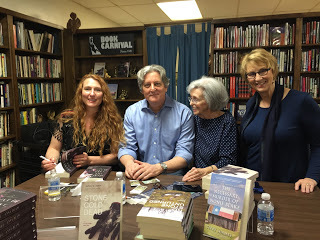
Quite frankly there’s never enough to feed the hunger of the promo machine. I could spend much more time and energy on it and it still wouldn’t be enough. The idea of promotion is to introduce yourself to prospective readers, booksellers, and those who might be willing to write reviews. It can be a lot of fun and very invigorating. It can also eat up time that could be spent writing.
There’s no one to tell you when you’ve reached an optimum amount of time and energy expenditure. So it’s up to me to decide where to draw the line. I’m not sure I’ve figured out where that line is just yet, but I’m gathering info. I spoke with a seasoned author who told me she isn’t doing any events this year. She’s tired and her budget is shot. She has decided to put her time and energy into writing her next book.
I’m not ready to give up the travel yet. First, I’m not well-known enough. Every time I read at a bookstore or library event, there is promotion that gets my name out there. I still need that exposure to let people know about my books. Plus, I like it. I like speaking in front of people who love books, answering their questions, and hearing their perspectives. I enjoy meeting the booksellers and exploring their bookstores to see what kind of books they stock. I like meeting other authors that I’m paired with. For now that makes it worth the time it takes to go to these places.
But is it worth the expenditure of energy and money? It’s expensive to travel—flights, hotels, and meals. Is it worth the exhaustion that accompanies so much activity? Is it worth the disorganization that you feel when you get home and have to struggle get back your writing mojo?
As long as I am having fun, I’ll keep doing it, but if it ever feels like I’m doing this to the detriment of my writing, then it will be time to figure out other ways to promote my books. I know every writer faces this frustration, and I’ll keep my ears open for other ways of promoting. Until then, wish me bon voyage!
Published on February 10, 2016 07:06
February 3, 2016
Thinking up a (short) story

I was asked to contribute a short story for an anthology, and I agreed with great enthusiasm. That was last night after a couple of margaritas. I would most likely have said yes anyway, but the margaritas didn’t help my impulse control. In the cold light of dawn, I woke up and thought, “Idiot! You have no idea how to write a short story.“
I suspect that plenty of people think that because I write novels, writing a short story should be a snap. Hey, it’s just a short novel, right?. And instead of weaving together lots of ideas, you only have one central idea. What’s the big deal?
The big deal is that I think in novel length stories. My plot ideas spin out in big loops that come back to include another idea, and before I know it, I’m embroiled in a mass of story lines. Sticking to one story feels to me like trying to sit on a cat. It scoots out from under you before you can pin it down.
Also, the best short stories I’ve read have a clever twist. That means I pretty much have to know what the twist is when I start the story—exactly the opposite of the way I usually work. In a novel I get to meander around and get to know the characters, one of whom eventually reveal himself to be capable of some kind of mayhem. No meandering allowed in a short story.
The one thing I do have going for me is that I like to be concise in my word usage. You can’t waste words when you write a short story. Every word has to count.
Questions I’m asking myself: Should I start with a plot idea or a character? Or should I first determine what kind of story I’m going to write—humorous or dark; amateur or professional; historical or modern? Should I outline it or just write? Should I use a character from my series, or a fresh new one? Most crime novels have murder at the core. Is that true of short stories as well?
I’ve written short stories, but they have usually come to me in bursts of inspiration. The idea of sitting down to “think up” a short story flummoxes me. One technique I’ve used when I start looking for a novel plot is to write down ten ideas, no matter how crazy they may seem, and then start thinking about them. That’s what I’ll probably do, unless…hmmm. I think of someone like Pat Morin who churns out one clever short story after another. Maybe I need to follow her around for a few days and hope she discards a stray idea.
Book Recommendation: At BookPeople l I had the privilege of reading with two fine writers. One was Josh Stallings, whose book Young Americans I read and blurbed in the fall and recommended in an earlier post. The other writer was Scott Frank, a long-time screenwriter of note (Dead Again, Marley and Me, A Walk Among the Tombstones among many, many others), whose first novel has just come out. Shaker is a dynamite novel. It’s a bit Elmore Leonard and a bit Raymond Chandler. It’s a novel with heart and humor sprinkled into a fine noir sensibility. Read it!
Published on February 03, 2016 05:56
January 27, 2016
On the Road Again
I’m on book tour! I’ll be hopping from place to place until the end of February talking in bookstores and libraries about my latest book, The Necessary Murder of Nonie Blake, which came out January 12.

Here are some questions people ask me about touring:
Do you arrange your own events? Yes, I do. My publicist helps if I need her to, but I enjoy the direct interaction with booksellers and librarians. If I get an offer to read in one bookstore, I make the trip pay off by arranging something in a nearby town. My publicist would do that, but she’s back east and I get the feeling that everyone in New York thinks that everyplace in California and Texas is close to everyplace else. If you’re doing events in Los Angeles, you have to realize that “Los Angeles” is a loose term, meaning it can easily take three hours to get from one part of the LA area to another. .
Does your publisher pay for your tour? In my dreams! You have to be in a rarefied atmosphere for this to happen. You have to have name recognition. This explains why I generally stick to the Bay Area where I live; the LA area, where my son lives; and Texas, where I have a pack of relatives. Even then, I am a hotel rat. I like to stay in hotels. Every now and then I stay with friends or family, but being away so much for a couple of months, I can’t afford time away from my computer. In a hotel room I can spend time writing and not feel guilty being anti-social.
How do you decide whom you are going to read with? Often it’s the bookseller who puts authors together. It’s a great way to meet other authors to cross-pollinate you readers. I’ve done events alone, but I really like sharing. I will be doing several events with Susan Shea, an author friend who has a book coming out in early February. In the past two weeks I’ve done four bookstore events with fellow authors of my Seventh Street Books publisher. I love their books and have had a great time being with them.
Next week I’ll be at BookPeople in Austin—my home away from home--appearing with two authors who write books completely different from mine. Josh Stallings has written a terrific caper set in 1970’s California called Young Americans. And Scott Frank’s Shaker is a hard-boiled novel set in LA, featuring a New York hit man who is a fish out of water in LA. I can’t wait to find out how mystery bookseller extraordinaire Scott Montgomery is going to interview three such different authors.
Do I get tired of touring? No. I’m a relaxed traveler. I don’t worry about lines or delayed flights or the people seated around me. I figure it’s a short time and then it’s over. I usually try to get some work done on the plane. If I can’t concentrate on writing, I’ll go through old emails and clean out my inbox. I don’t obsess about food. A hamburger is fine. I don’t get lonely. And I’m a good sleeper. Most importantly, I trust people. I know if things go really wrong, someone will help. Yes, there are times when suddenly I’m grumpy or disappointed or nervous. A bath, a glass of wine, and junk TV solves a lot of problems.
Book Recommendation: I had been saving Glen Erik Hamilton’s Past Crimes, and when I found out it was nominated for an Edgar for Best First Mystery, I thought it was time to dive in. It’s a good, solid thriller, with believable characters and action that is just the right amount of over-the-top. As a bonus, the writing is sharp and I found no typos, which is unusual these days.
Published on January 27, 2016 07:12
January 20, 2016
Take a Deep Breath

Three times this week I’ve gotten the same advice from writer friends. I was complaining that the thriller I’m working on—and have been working on for 18 months—was taking forever. I had just been at a reading where someone asked me how long it took me to write a Samuel Craddock book. I breezily said it takes anywhere from two to four months.
Hearing my complaint, my friends said that I had to realize that the Craddock novels were extremely rare. They reminded me that most people take a long time to write a book. I sulked. I want to be done with it! Tough, they said. Some books take longer than others. Take a deep breath and relax.
Since they are both fine writers who produce great books, I had to listen to them. Then the coup de grace happened .The next day one of my all-time favorite writers, Nancy Pickard, pasted this on Facebook: “Sometimes writing feels like waiting for a slowly dripping faucet to fill up a glass. The good part is that if I actually do wait, what comes out is clear and satisfying to me…If I try to force the tap, I get swamp water.” I commented that she was the third person to give me that message. And she said it was a powerful message from the universe. And she also said that waiting was hard for an author. She’s got that right!
Partly because it took me so long to get published, I always feel like I’m playing catch-up. There are so many stories I want to write that I always feel like I’m behind. At least I’ve learned not to stop in the middle of something and start something new, unless the something new is under contract.
I started book six of my Samuel Craddock series last week and the contrast couldn’t be greater. I’m pouring words onto the page. I’m already 12,000 words into it, and the only thing that stops me every day is physical exhaustion. I can’t type another sentence. If only I knew my thriller protagonist as well as I know Samuel. I continually ask myself why I don’t. The thriller is set in California, where I’ve lived a lot longer than I ever lived in Texas. Why should the man at the center of it be such a cipher?
I worry that I’m a one note Jennie, that I don’t have the ability to imagine a fresh new character. But then I remember that in every Craddock book new characters show up all the time, and I never seem to have any problem seeing and understanding them.
I think about advice I have given and received about how to develop characters and nothing feels workable. So I have decided to keep plugging away and try to trust the process. I keep thinking that somehow in this delicious story that I’ve come up with, I able to locate the essence of the character.
Book recommendation: Adrian McKinty is up for an Edgar. I discovered him this year and read the first three books in his series about the Irish “troubles,” set in the 1980’s, in rapid succession. If you haven’t read him, you’re missing a powerful writer.
Published on January 20, 2016 06:53
January 13, 2016
Launch Day
There’s nothing like Launch Day to get the blood moving. A good thing because I’m in Los Angeles doing some readings at bookstores, and it’s freezing! (And who said, “I’m not taking a coat to LA—it’s never cold there!”?)
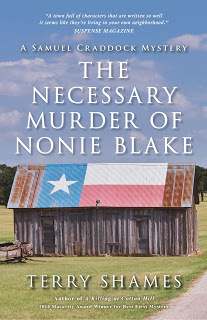
Yesterday was my fifth launch day and I still feel like a beginner. I wonder what it’s like to be somebody like Rhys Bowen who has written at least 100 books and who brought out three last year alone. Ho hum, another launch day.
Here are some things I wonder about old hands:
Do they ever really learn Mailchimp? Or, like me, do they face the Mailchimp template knowing they’ve done it before, but not remembering how? Or do they do what I keep promising myself to do and hire a tech-savvy assistant?
Do they have a promo routine down pat? Or, like me, do they frantically search for the “to do” list that they made the last time…and the time before that?
Do they ever refuse bookstore or library talks for any other reason than time conflict? Or do they say, “sure, I can do that,” knowing that it means racing to the airport at some ungodly hour and taking a flight that has a five-hour layover because that’s the only flight all day?
Do they eventually not care if they are on panels at conferences, or do they jealously guard every opportunity to show their faces?
Do people ever stop asking them how their “little writing hobby” is going?
Do they ever stop being terrified that the next book will prove that their good books were a fluke? And that their editor will tell them not to let the door hit them on the way out?
But for one week all that gets pushed away. Reviews have been good, lots of congratulations, and I’m actually 10,000 words into #6. Not bad.
On another note, I thought I would never put an animal in a prominent position in one of my books. But when I was writing The Necessary Murder of Nonie Blake, a dog named Frazier bullied his way in. I hope my readers like the result.
Which brings me to the book recommendation of the week.
A little background: When I was a debut author, I was invited to the Tucson Festival of Books. It was my lot to be paired in my first signing with Spencer Quinn. He was really nice—or, rather, as nice as he could be while being swamped by readers wanting him to sign books. “He writes books about a dog!” I thought bitterly, as his happy readers eyed my non-existent line of fans.
Fast forward to a few months ago when someone gave me a copy of “Dog On It,” by Spencer Quinn. The friend said she loved it. I just got around to reading it and now I know why all those people stand in line for Mr. Quinn’s books. It’s a great read!

Yesterday was my fifth launch day and I still feel like a beginner. I wonder what it’s like to be somebody like Rhys Bowen who has written at least 100 books and who brought out three last year alone. Ho hum, another launch day.
Here are some things I wonder about old hands:
Do they ever really learn Mailchimp? Or, like me, do they face the Mailchimp template knowing they’ve done it before, but not remembering how? Or do they do what I keep promising myself to do and hire a tech-savvy assistant?
Do they have a promo routine down pat? Or, like me, do they frantically search for the “to do” list that they made the last time…and the time before that?
Do they ever refuse bookstore or library talks for any other reason than time conflict? Or do they say, “sure, I can do that,” knowing that it means racing to the airport at some ungodly hour and taking a flight that has a five-hour layover because that’s the only flight all day?
Do they eventually not care if they are on panels at conferences, or do they jealously guard every opportunity to show their faces?
Do people ever stop asking them how their “little writing hobby” is going?
Do they ever stop being terrified that the next book will prove that their good books were a fluke? And that their editor will tell them not to let the door hit them on the way out?
But for one week all that gets pushed away. Reviews have been good, lots of congratulations, and I’m actually 10,000 words into #6. Not bad.
On another note, I thought I would never put an animal in a prominent position in one of my books. But when I was writing The Necessary Murder of Nonie Blake, a dog named Frazier bullied his way in. I hope my readers like the result.
Which brings me to the book recommendation of the week.
A little background: When I was a debut author, I was invited to the Tucson Festival of Books. It was my lot to be paired in my first signing with Spencer Quinn. He was really nice—or, rather, as nice as he could be while being swamped by readers wanting him to sign books. “He writes books about a dog!” I thought bitterly, as his happy readers eyed my non-existent line of fans.
Fast forward to a few months ago when someone gave me a copy of “Dog On It,” by Spencer Quinn. The friend said she loved it. I just got around to reading it and now I know why all those people stand in line for Mr. Quinn’s books. It’s a great read!
Published on January 13, 2016 09:43
7 Criminal Minds
A collection of 10 writers who post every other week. A new topic is offered every week.
- Terry Shames's profile
- 274 followers



